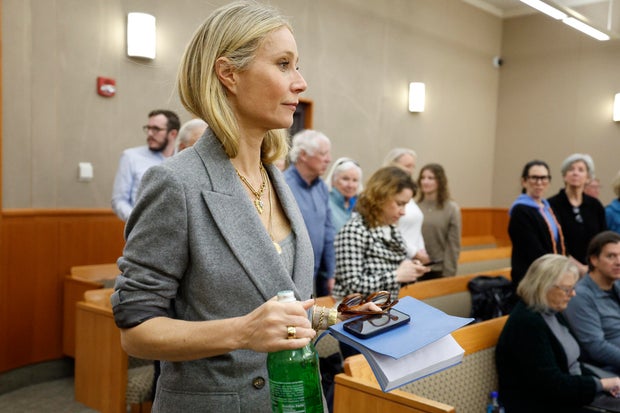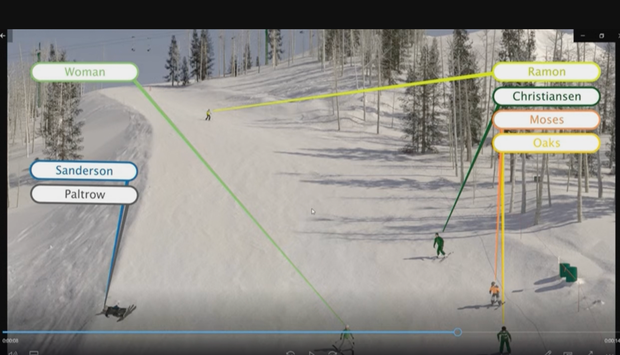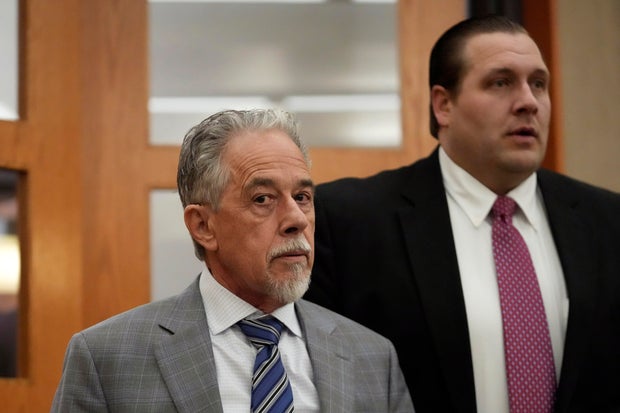The trial over a 2016 ski accident involving actor and businesswoman Gwyneth Paltrow wrapped up Thursday, with the jury ruling that she was not responsible for the collision at a Utah ski resort.
After a short deliberation, the jury concluded that plaintiff Terry Sanderson was entirely at fault for the collision, with the decision ultimately hinging on which party jurors believed was higher on the slopes when the crash occurred.
Sanderson, 76, sued Paltrow for $3.1 million after alleging that she crashed into him at the tony Deer Valley resort in Park City, Utah. After a judge dismissed his initial suit, he later refiled his complaint seeking more than $300,000. Paltrow, 50, countersued for a symbolic $1 and attorney fees.
In each taking the stand last week, Paltrow and Sanderson presented starkly different accounts of the collision and called a succession of medical experts and witnesses to buttress their claims. Paltrow’s ski instructor at the time of the incident, Deer Valley veteran Eric Christiansen, blamed Sanderson for the crash, which occurred on a beginner ski run.
“Gwyneth was making her turns very rhythmically,” he said under oath, while alleging that Sanderson “was making wide radius turns and taking up a large swath of the ski slope.”
For his part, Sanderson has accused Paltrow of barreling into him, breaking four of his ribs and causing a severe concussion whose symptoms lingered for years. Despite these dueling accounts, legal experts said the case will likely turn on something more tangible: Paltrow’s and Sanderson’s respective location on the mountain just before the crash occurred.
Uphill, downhill
Sanderson sued Paltrow in 2019, claiming she was skiing recklessly and crashed into him from above. Paltrow’s countersuit claimed Sanderson hit her from behind. The case hinges on which of the two parties acted in an unreasonable manner while on skis, attorneys told CBS MoneyWatch.
“When one skier hits another, the issue is negligence. Did they do something wrong?” said personal injury attorney Roger Kohn, of Kohn Rath Law.
Jeff Swinger / AP
As far as conduct on the ski slopes go, it’s almost always the duty of the uphill skier to beware of the downhill skier. In other words, the downhill skier — the person who is further down the slope — has the right of way.
“The uphill skier has to watch out for the downhill skier. If you’re overtaking someone and hit them, chances are you are liable and at fault,” Kohn added.
According to the National Ski Areas Association’s responsibility code, which governs ski resorts in North America, “people ahead or downhill of you have the right of way. You must avoid them.”
Skiers must also “always stay in control” and be able to stop to avoid other people.
An animated recreation of the pair’s crash, which was introduced in court Monday, shows the skiers’ positions relative to one another from Christiansen’s perspective. It also depicted Paltrow lying on top of Sanderson following the collision.
Christiansen explained that Paltrow could only have ended up on top of Sanderson if she had been hit from behind.
Collisions happen
Ski collisions are not uncommon and when injuries result, lawyers sometimes get involved.
“Some lawyers based their whole career on ski accidents,” Bryn “Butch” Peterson, a veteran Colorado ski instructor, told CBS MoneyWatch. He added that he once saw a woman get hit by a skier who came “blasting out of a tree trail” in Vail, Colorado.
Rick Bowmer / AP
But unlike that incident, most ski accidents aren’t caused by skier-skier or skier-snowboarder collisions; they happen when skiers hit a tree or other type of obstacle.
There were 57 reported fatal incidents during the 2021-2022 ski season, according to NSAA, most of which resulted from skiers hitting trees. Males represented 95% of all fatalities. There were an additional 54 reported “catastrophic” incidents during the same season.
Homeowners insurance
Most homeowners insurance policies also include general liability coverage that essentially follows a homeowner around even when they’re outside of their residence, including when they are on skis.
“It covers you if there’s something dangerous in your home or on your property and someone gets hurt and sues you, but it also follows you around if you’re at the grocery store and run a kid over with a shopping cart, and it covers ski collision claims,” said David Cutt, of Cutt, Kendell & Olson in Salt Lake City, Utah.
“So that’s what is going on here. In this case, if Paltrow has homeowners coverage, then that steps in and pays a settlement or a judgement unto the limits of the policy,” he said.
Typically, a lawyer would only get involved if the defendant is wealthy or has homeowners insurance, according to Kohn.
“If you sue someone who doesn’t have homeowners coverage, it’s a waste of time,” he said.
But, he added, if they have insurance, that policy will kick in, and the insurer will defend the claim as well as pay it.
It’s not always the case that one party is negligent in a two-person collision.
“But there is a clear case of liability if you can show the other skier was skiing too fast, acting improperly or should’ve seen the other skier,” he said.
He said, she said
Cutt said he’s tried dozens or more of these cases in Utah and the judgment always hinges on who the jury believes were the uphill and downhill skiers.
“In this trial, Sanderson says he was the downhill skier and she ran into him from behind, and she says exactly the opposite — that she was skiing along and he plowed into her from uphill,” Cutt said.
“So what it’s going to come down to is, the jury is going to listen to everybody about the collision itself and the aftermath and decide who they think is credible and who isn’t,” Cutt said before the jury reached its decision. “And the fact that it’s Gwyneth Paltrow is the big elephant in the room.”


